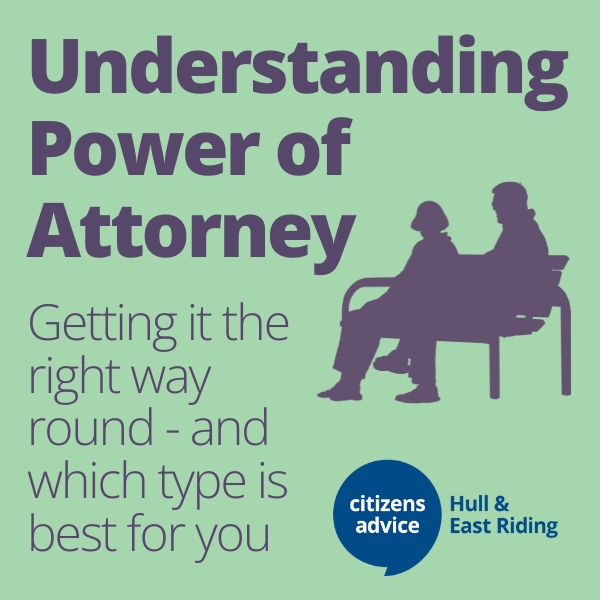Understanding Power of Attorney: getting it the right way round
At Citizens Advice Hull & East Riding, we’re seeing more and more people come to us with questions about Power of Attorney but often, the questions are being asked the wrong way round.

Many people contact us asking, “How can I get Power of Attorney for my mum/dad/spouse?”
However, you can’t create a Power of Attorney for someone else.
A Power of Attorney is a legal document that must be set up by the person themselves, while they still have the mental capacity to make their own decisions. This person is known as the ‘donor’, and they choose someone they trust (the ‘attorney’) to make decisions on their behalf in the future, if they ever become unable to do so.
There are two types of Power of Attorney
Ordinary Power of Attorney – this is if you would like to give someone temporary control over your financial decisions. For example, if you have a physical illness. It can be given for a set period of time, too.
Lasting Power of Attorney – this is usually done by someone so that it can be used if they do lose the ability to make decisions for themselves (also known as mental capacity). It can be done for finance and property, or for health and welfare, or both. This is where you would choose an attorney, and it must be registered before it can be used. Finance and property include things like managing your bank accounts and deciding what happens to your home if you are no longer able to live in it. Health and welfare include things like making decisions on any medical treatment you may need.
You can decide what you would like your attorney to be able to do, and when you would like them to do that, if you like. Usually, once a Lasting Power of Attorney is registered, your attorney(s) can start acting on your behalf straightaway. If you do not want them to be able to do that, you can add that in.
Our advice
If you or a family member are thinking about setting up a Power of Attorney, it’s best to plan early. It can give everyone peace of mind that decisions about health, finances, and care will be handled by someone trusted, if the time ever comes.
How to register Power of Attorney
- The forms that need to be completed can be found here
- Details of how much the forms cost can be found here
The key thing to remember
Only the person who wants to give someone else authority over their affairs can set up a Power of Attorney.
You can’t apply for Power of Attorney for someone else, even if they’re your parent, partner or relative.
If your loved one has already lost the mental capacity to make decisions, there are still legal options available – but they are different. In those cases, you may need to apply to the Court of Protection to become a deputy, which gives you similar powers to make decisions on someone’s behalf.
